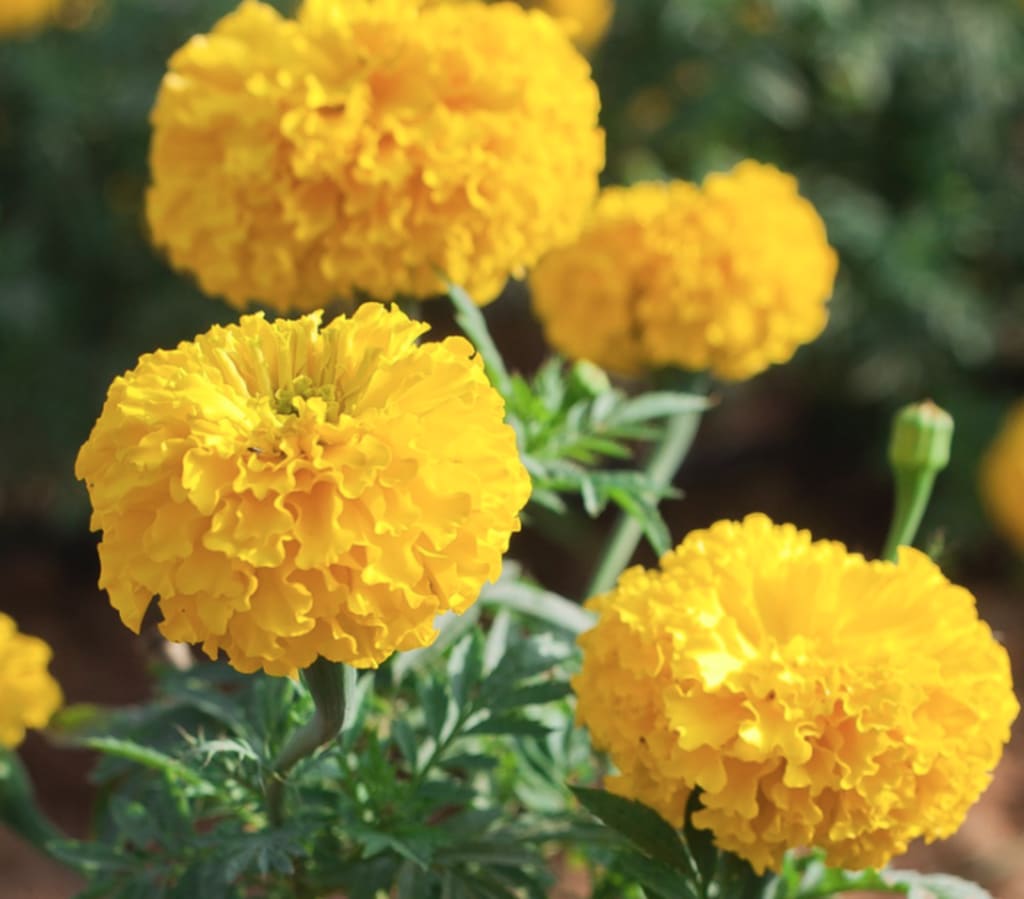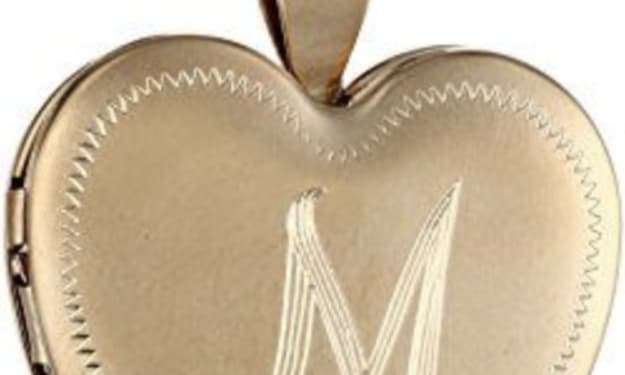
Before the marigolds were food, they were crowns. In late May, as the deep spring greens were beginning to dry and crackle brown, Elodie and her sister would jump the fence at the back of the garden and run into the hills. They would dig through the roots and weeds around the edges of the trees, until one of them, usually Annabeth, spotted a flash of yellow burrowed in the shrubbery. Then it would be a race to the flowers, white skirts ripping on brambles and thorns, to see who could be the first to snatch the blossoms up from the soil. The winning girl, also usually Annabeth, would dig her nail through the stem, and thread the flower through the stem of another. Elodie imagined that the chains of golden blossoms looked just like the tiaras that the queens of England wore in her favorite storybooks. When the setting sun made their crowns glow like warm pebbles, the sisters would traipse home. They dragged their heavy limbs under the fence and down the short dirt road to their house. Their mother would shriek at the state of their ruined dresses.
“It’s going to take me hours to fix these.”
“But look at our crowns, Mama,” Elodie would reply, twirling.
“Those are very pretty flowers,” their mother retorted. “And they will do exactly nothing for me when they’re all dried up and I’m awake at 2:00am sewing your skirts back together. I don’t want you going back out there. Is that clear?”
“Yes, Mama,” Annabeth said, nodding solemnly.
The next day, the girls woke up just as the first fingers of morning light snuck under the curtains. They shucked off their nightgowns and crept into the kitchen, where their newly mended dresses hung on the drying rack next to the sewing machine. Elodie ran her fingers along the new blue scars of thread that cut across the white fabric.
“I think they’re prettier after Mom sews them up, anyway.”
“Me too,” said Annabeth. They slipped the dresses over their heads. Elodie looked at Annabeth, and Annabeth looked back at her. Then the girls started to run at full pelt, out the back door and towards the fence between the house and the shadowy hills beyond.
…
In July, Annabeth’s dress got torn particularly badly. Summer had dried fallen branches into rotting teeth, that snagged and bit at the girls as they clambered through the woods in search of flowers. One sharp branch had caught Annabeth’s midriff, and torn a clean line from the ribbon around her waist through the hem of the skirt. Annabeth had tried to stick the fabric back together with sap and mud, but by the time the girls arrived home, the dress was hanging off her like molting skin.
Their mother was waiting on the front porch. In the reddish light of sunset, Elodie thought that her eyes looked red. The sisters braced themselves for a scolding, and a swat around the head with the newspaper.
“Where were you?” their mother asked. Her voice was barely above a whisper, and her hands clenched into fists at her side.
“Making flower crowns, Mama,” Annabeth replied. Their mother chewed her lip.
“Didn’t I tell you,” she said in that same quiet tone, “not to go out again?”
“Yes, Mama, but -”
“Didn’t I tell you that when you go out, I have to spend all night repairing your dresses?”
“We’re sorry Mama.” Annabeth’s voice had gotten quiet too.
“I’m not fixing those dresses this time.” Their mother turned to walk back into the house. Then suddenly, she reached out and grabbed the flower crowns off the girls’ heads. She looked the girls in the eyes, and ripped the heads off the marigolds, one by one. When she was finished, she ground the stems into the ground with the heel of her shoe. Elodie and Annabeth watched her stalk back into the house. All around them, the yellow blossoms from their flower crowns pockmarked the ground, leaving the land like honeycomb around them.
That night, Elodie couldn’t sleep. She had never felt scared of her mother before, but that evening her mother had seemed to be wound up so tight that a snap could tear the paint of the walls of the house. She could still hear her in the kitchen, pacing back and forth and occasionally slamming cabinet doors. After what seemed like an eternity, the footsteps stopped, and the house settled. Elodie slipped out of bed and snuck along the narrow corridor to the kitchen. In the dark, she could see the silhouettes of their dresses, hung up on the drying rack where they always were. Elodie inched closer. The white fabric was clean, but the rips were still there. It was then that Elodie noticed that there was no thread in the sewing machine. She ducked under the table and opened the quilted sewing box her mother kept by the pedal. It was empty as well. Elodie took a deep breath and stole back through the dark corridor towards bed. The nearest fabric store was an hour away from Mama’s work, which was itself an hour away from their little house on the hill. Mama hated driving through the twisty mountain roads, particularly in the dark. She had been angry about an extra trip to the store. Tomorrow, when the long journey was done, she’d feel better. Elodie curled up in a ball under the covers again. This time, she was asleep before her head hit the pillow.
…
Mama did not go to the store the next day. She did not go to work either. She sat in the overstuffed armchair in the corner of the living room, holding a cup of tea long after it had gone grey and cold. Annabeth and Elodie stayed in their room. Annabeth once tried to sneak out for biscuits, but the strange, cold look on their mother’s face as she reached for the cabinet sent her scurrying back towards their room. She curled up against Elodie, who was sitting on the floor, her back against the foot of the bed.
“What do you think the matter is?” Annabeth asked.
“I don’t know. I thought she was just upset we were out of thread.”
“Maybe she’s just not feeling very well.”
“Maybe,” Elodie agreed. Even as she said it, she knew it wasn’t true. That evening, both girls got into bed while it was still light out. They lay flat under the covers with their eyes closed, as if pretending to be asleep would bring the night faster.
“I think she’ll be better tomorrow,” Annabeth whispered.
“I hope so,” Elodie replied. She could still feel the sun against her closed eyelids. Tomorrow seemed determined not to arrive.
…
It was seven tomorrows later before the girls saw their mother get out of the armchair. On Sunday, Mama sprung up without warning, and disappeared into the hallway. A few moments later, she returned with a bucket of water and a scrubbing brush. She spent the rest of the afternoon on her hands and knees, and then her tip-toes, scrubbing the walls and floors until the inside of the house glowed pink and clean like an empty stomach. Once Mama was satisfied, she grabbed the car keys off the table, and jumped into the rusted Chevy.
“Don’t you make a mess,” she barked out the window. Elodie and Annabeth watched the car trundle down the driveway and loop around the hills, and out of sight. Annabeth reached for Elodie’s hand.
“You see? She’s better.”
“Yeah, she seems okay.” Hope grew like moss inside Elodie’s stomach. The girls hovered in the middle of the living room, careful not to touch anything. Elodie worried that the slightest movement would somehow disrupt the house, make it turn in on itself and regurgitate the dirt and grime that had sprung up around them in the last week. So instead of playing or running around, she sat on the carpet, hands in her lap. Annabeth sat next to her. She was wearing an old dress, since hers was still torn. It was too small, and she kept squirming, trying to pull the tight column out of the folds under her arms and stomach.
“Quit fidgeting, Anna,” Elodie hissed.
“It doesn’t matter, Elodie,” Anna snapped back. But she stilled anyway.
After what seemed like an eternity, the sisters heard wheels on gravel. They sprung up, and dashed to the front door, Anna taking the opportunity to pull her dress down as far as it would go. Their mother strode past them into the kitchen, carrying two brown shopping bags. Annabeth and Elodie rushed to help her, unloading cans of rice and green beans onto the table, for Mama to put in the cabinets. Soon, the bags were empty. Elodie surveyed the groceries.
“You forgot the thread, Mama.”
“And the sugar,” Annabeth added. Their mother straightened her shoulders and turned towards the cabinet.
“There’s going to be no thread or sugar for a little while.” She straightened a jar of sweetcorn, then turned around and gave them a toothy smile.
“It’ll be good for us. We’ll have to be creative for a bit. And besides, Anna, I think that old dress suits you better anyway.”
…
It was October before Anna wore her white dress again. By then, the old dress that had dug red lips into her shoulders and waist hung loose and swung around her torso like a breath. Mama had started to go to the grocery store once every three weeks. She would not let the girls see what she brought back.
On the last Saturday of the month, Annabeth and Elodie were sweeping the floors when their mother called them into the kitchen. She handed Annabeth the ripped dress.
“Could you go find some marigolds for me, girls?” The sisters stared at her.
“Why?”
“I think we could use some.” Mama stared at a spot over the girls’ heads. “Go now, and hurry. I don’t want you out after dark.” Anna looked at her once more, then without a word slipped the dress over her head and walked towards the back door. Elodie followed.
The hills looked darker and meaner in autumn. The shadows came down like a heavy eyelid, and in the blue night the girls could barely see the colors on the hill. It felt like hours before they spotted dark yellow pebbles, hidden away behind a mossy log. The flowers were almost wilted, but the girls gathered them up anyway. By the time they got to the house, the sky was black. They handed the too-small bouquet up their mother, who stood at the stove in front of a pot of boiling water. Without looking down, Mama dropped the flowers into the soup.
…
Later that night, as they lay in bed. Elodie looked over at Anna.
“I don’t think the queens in England ever ate their crowns,” she whispered. Anna tried to smile.
“They’re not as good, then. All the best things are good to eat.”
“Yeah,” Elodie replied. She did not mention that the flowers tasted like blood.





Comments
There are no comments for this story
Be the first to respond and start the conversation.